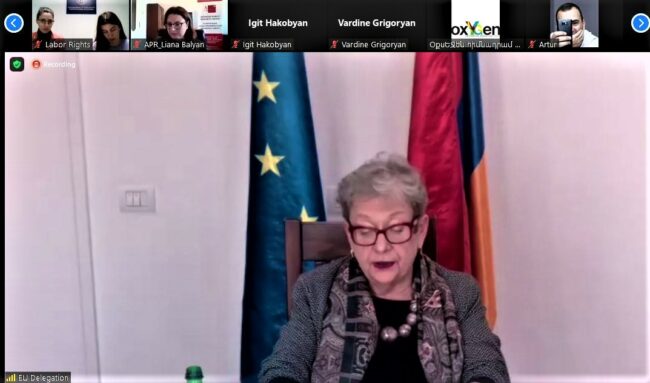More than 60 attendees – representatives of the RA Government, international community, civil society organizations learnt about the results of the studies on situation of labour rights protection in Armenia, real cases of labour rights violations, the impact of COVID-19 on labour rights in Armenia, the needs related to the labour rights in Armenia, and best practices of establishment of Trade Unions in European Union during an online event. The five studies were carried out by the member CSOs of the consortia of three projects funded by the European Union.
“In its permanent dialogue with the authorities and civil society, the EU stands by Armenia to improve and respect the labour rights. Labour law should not be seen as an obstacle to entrepreneurial freedom, but rather as a tool to facilitate social dialogue,” H.E. Ms. Andrea Wiktorin Ambassador, Head of the EU Delegation to Armenia said in her welcome speech. The event was attended by Ruben Sargsyan, Deputy Minister of Labour and Social Affairs of Armenia, and Hakob Avagyan, Head of Health and Labor Inspection Body of Armenia who also welcomed the participants.
The studies revealed a number of problems related to the labour rights situation in Armenia. In particular, as a common conclusion, three of the studies – the “Research on the Situation of Labour Rights Protection in Armenia” (the full Report) the “Comprehensive Needs Assessment Research” and the “Evidence Collection on the Real Cases of Labour Rights Violations and Court Cases” indicated the problem of lack of awareness of the employees on their labour rights. All three researches include recommendations to act towards raising public awareness regarding benefits and entitlements upon separation, safeguards against arbitrary dismissal as well as available remedies in place, especially in marzes, for those employed in private business as well as among women to empower them to stand for their rights.
Other finding of the studies indicate that:
- 16․7% of the respondents do not have an employment contract;
- 6.8% of the respondents mentioned the existence of a high level of exposure to hazard factors in their workplace, and 79.2% of the respondents do not get any compensation if hazard factors exist in their workplace;
- Only 15.2% of those who have ever expressed their dissatisfaction regarding working conditions to their employer, immediate supervisor or superior body had the relevant issue resolved as a result of expressing dissatisfaction, 45.8% had the issue partly resolved, while 35.6% did not reach any solution;
- Only 28.3% of the respondents had trade unions in their workplace. The majority of the respondents (85.7%) mentioned that they had never united with colleagues against the employer in order to solve an issue or protect their labour rights;
- Young people have difficulty in finding a suitable job due to lack of work experience, or they find a job with a very low salary. For 26% of the respondents, young age played a negative role in finding a job, and for about 50% of them, the absence or lack of work experience prevented them from finding the job they wanted;
- Some women face obstacles while looking for a job or a change/promotion. For 22.7% of female respondents, being female played a decisive role when looking for a job or during a working activity, and for 52% of the latter, that role was negative.
- The majority of organizations operating in both the public and private sectors in the Republic of Armenia do not yet have the necessary opportunities for the movement of the disabled, which is a big obstacle to hiring such people. Many employers simply avoid hiring people with disabilities, worrying that their health may often lead to absenteeism;
- In Armenia people have very little information about labour protection and control structures. More than half of the respondents, 54%, do not know where to go in case of violation of labour rights;
- The overwhelming majority of court cases related to labour rights were brought against the state- and municipality-owned organizations, such as schools, medical centers, universities, as well as ministries and municipalities as such. According to the data challenging the dismissals remain low in the private sector.
The results of the “Impact of the Covid 19 Pandemic on the Labour Rights Situation in Armenia” and “Best Practices of Establishment of Trade Unions in the EU” studies were also presented during the event.
The CSOs forming the three consortia implementing the projects aimed to improve labour rights situation in Armenia came up with a decision to continue coordinated efforts in the sphere.
The full recording of the event is available HERE. All the studies will be published and shared with the stakeholders after finalization.
***
The three EU-funded projects on labour rights and social protection in Armenia
“Labour Action: Collaborative Effort for Accountable and Inclusive Employment’’ project is implemented by Union of Employers of ICT, Armavir Development Center and Kiraki Development Foundation.
“Decent work now!” project is implemented by Helsinki Citizens’ Assembly – Vanadzor, Transparency International Anti-Corruption Center, Advanced Public Research Group, Factor Information Center NGO in cooperation with Education and Solidarity Union.
“EU4LabourRights: Increasing Civic Voice and Action for Labour Rights and Social Protection in Armenia” project is implemented by OxYGen Foundation, Socioscope NGO, “Asparez” Journalists’ Club NGO, Armenian Progressive Youth NGO, Media Diversity Institute – Armenia in cooperation with Protection of Rights without Borders NGO, and Eurasia Partnership Foundation.
